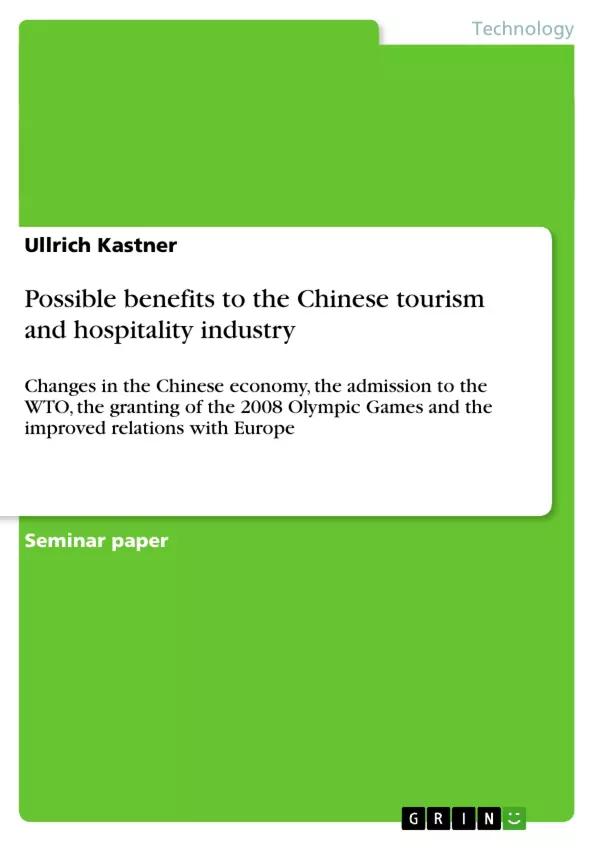On the 11 December 2001 China became a full member of the World Trade Organisation
(WTO). It was the final step in a long chain of events, which preceded the full membership of
the communistic country. As China is the second biggest trading power in the world with a GDP
of US$ 4.5 trillion, it could no longer be ignored by the western countries, and more and more
other nations, especially in Europe, increased their bilateral relations with China. This country in
the Far East has not only one of the oldest cultures in the world, but has also one of the biggest
and most profitable markets to become accessible for western companies. With a population of
1.4 billion people China has also the highest population on this planet. Its main economic factors
are agriculture (rice, soja), natural resources (coal, gold, oil) and industry (garment, metal). But
tourism is playing a more and more important role for this country. With the granting of the
Olympic Games 2008 in Beijing, the Chinese government expects a major boost in the
hospitality sector over the next 10 years. [...]
Inhaltsverzeichnis (Table of Contents)
- I. Introduction
- II. Admission to the WTO
- A. History
- B. Reasons for China to join the WTO
- C. Positive Impacts
- D. Negative Impacts
- III. Olympic Games 2008 Beijing
- A. Olympic Plans
- B. Green Olympics
- IV. European Investments in China
- A. Transrapid
- B. Others
- V. Benefits for the Hospitality and Tourism Industry
Zielsetzung und Themenschwerpunkte (Objectives and Key Themes)
This paper examines the potential benefits of China's admission to the World Trade Organisation (WTO), the hosting of the 2008 Olympic Games, and improved relations with Europe on the Chinese tourism and hospitality industry. It analyzes how these events will shape the country's economic landscape and contribute to the growth of its tourism sector.
- The impact of China's admission to the WTO on its economy and tourism industry
- The expected benefits and challenges associated with hosting the 2008 Olympic Games
- The role of European investments in China's economic development and its impact on tourism
- The potential growth and transformation of the Chinese hospitality and tourism sector
Zusammenfassung der Kapitel (Chapter Summaries)
The paper begins by outlining the historical context of China's admission to the WTO, highlighting the country's economic rise and its efforts to integrate with the global market. It then explores the potential benefits and challenges associated with China's membership, including increased trade, foreign investment, and technological advancements. The paper also discusses the economic and social implications of the 2008 Beijing Olympics, emphasizing the event's potential to boost tourism and infrastructure development. Lastly, it examines the growing trend of European investments in China, with a specific focus on the Transrapid project and its impact on the tourism sector.
Schlüsselwörter (Keywords)
The paper focuses on key themes such as the Chinese economy, tourism and hospitality industry, World Trade Organisation (WTO), Olympic Games, European investments, Transrapid, and the impact of globalization on China's development. It explores the interplay between these concepts and their implications for the future of the Chinese tourism sector.
Frequently Asked Questions
How did WTO admission affect China's hospitality industry?
Admission to the WTO in 2001 opened up one of the world's largest markets to western companies, leading to increased foreign investment and travel.
What was the impact of the 2008 Beijing Olympics on tourism?
The Chinese government expected a major boost in the hospitality sector and infrastructure development due to the global exposure of the games.
What role do European investments play in China's development?
European investments, such as the Transrapid project, have significantly contributed to technological advancement and economic bilateral relations.
What are China's main economic factors mentioned?
Key factors include agriculture (rice, soy), natural resources (coal, gold, oil), and industries like garments and metal production.
Are there negative impacts of WTO admission for China?
The paper explores both positive and negative impacts, including the challenges of global competition and rapid economic transformation.
- Quote paper
- Ullrich Kastner (Author), 2002, Possible benefits to the Chinese tourism and hospitality industry, Munich, GRIN Verlag, https://www.grin.com/document/13727



